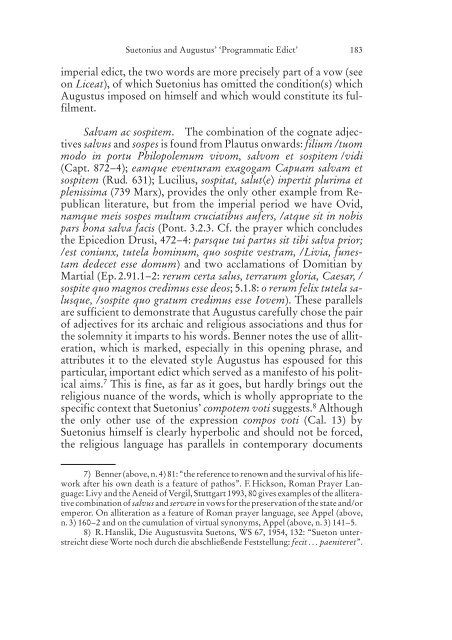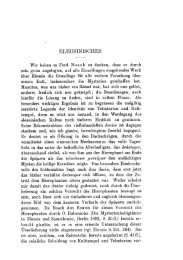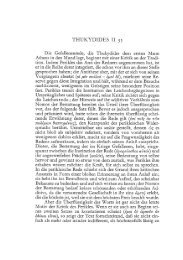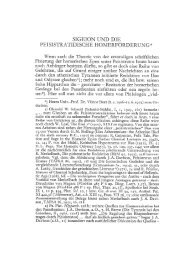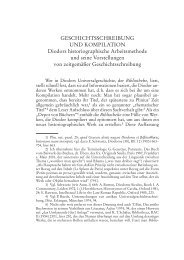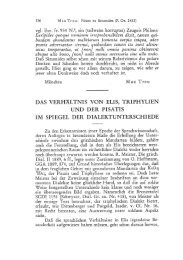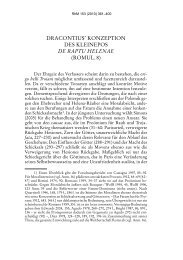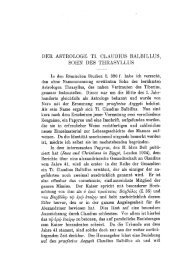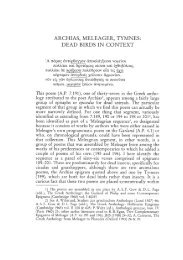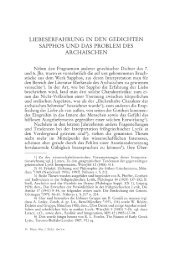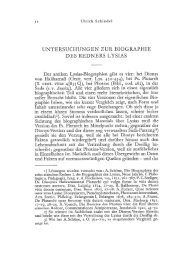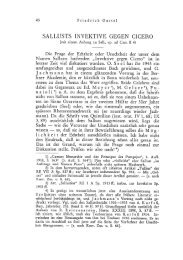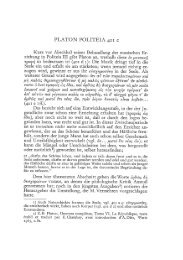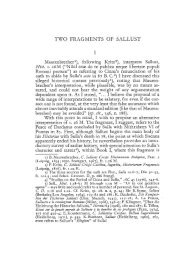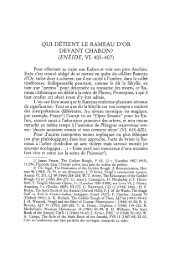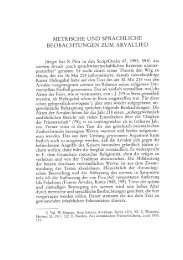VIRGILIO E STESICORO Una ricerca sulla Tabula Iliaca Capitolina *
VIRGILIO E STESICORO Una ricerca sulla Tabula Iliaca Capitolina *
VIRGILIO E STESICORO Una ricerca sulla Tabula Iliaca Capitolina *
Sie wollen auch ein ePaper? Erhöhen Sie die Reichweite Ihrer Titel.
YUMPU macht aus Druck-PDFs automatisch weboptimierte ePaper, die Google liebt.
Suetonius and Augustus’ ‘Programmatic Edict’<br />
imperial edict, the two words are more precisely part of a vow (see<br />
on Liceat), of which Suetonius has omitted the condition(s) which<br />
Augustus imposed on himself and which would constitute its fulfilment.<br />
Salvam ac sospitem. The combination of the cognate adjectives<br />
salvus and sospes is found from Plautus onwards: filium /tuom<br />
modo in portu Philopolemum vivom, salvom et sospitem /vidi<br />
(Capt. 872–4); eamque eventuram exagogam Capuam salvam et<br />
sospitem (Rud. 631); Lucilius, sospitat, salut inpertit plurima et<br />
plenissima (739 Marx), provides the only other example from Republican<br />
literature, but from the imperial period we have Ovid,<br />
namque meis sospes multum cruciatibus aufers, /atque sit in nobis<br />
pars bona salva facis (Pont. 3.2.3. Cf. the prayer which concludes<br />
the Epicedion Drusi, 472–4: parsque tui partus sit tibi salva prior;<br />
/est coniunx, tutela hominum, quo sospite vestram, /Livia, funestam<br />
dedecet esse domum) and two acclamations of Domitian by<br />
Martial (Ep. 2.91.1–2: rerum certa salus, terrarum gloria, Caesar, /<br />
sospite quo magnos credimus esse deos; 5.1.8: o rerum felix tutela salusque,<br />
/sospite quo gratum credimus esse Iovem). These parallels<br />
are sufficient to demonstrate that Augustus carefully chose the pair<br />
of adjectives for its archaic and religious associations and thus for<br />
the solemnity it imparts to his words. Benner notes the use of alliteration,<br />
which is marked, especially in this opening phrase, and<br />
attributes it to the elevated style Augustus has espoused for this<br />
particular, important edict which served as a manifesto of his political<br />
aims. 7 This is fine, as far as it goes, but hardly brings out the<br />
religious nuance of the words, which is wholly appropriate to the<br />
specific context that Suetonius’ compotem voti suggests. 8 Although<br />
the only other use of the expression compos voti (Cal. 13) by<br />
Suetonius himself is clearly hyperbolic and should not be forced,<br />
the religious language has parallels in contemporary documents<br />
7) Benner (above, n. 4) 81: “the reference to renown and the survival of his lifework<br />
after his own death is a feature of pathos”. F. Hickson, Roman Prayer Language:<br />
Livy and the Aeneid of Vergil, Stuttgart 1993, 80 gives examples of the alliterative<br />
combination of salvus and servare in vows for the preservation of the state and/or<br />
emperor. On alliteration as a feature of Roman prayer language, see Appel (above,<br />
n. 3) 160–2 and on the cumulation of virtual synonyms, Appel (above, n. 3) 141–5.<br />
8) R. Hanslik, Die Augustusvita Suetons, WS 67, 1954, 132: “Sueton unterstreicht<br />
diese Worte noch durch die abschließende Feststellung: fecit . . . paeniteret”.<br />
183


